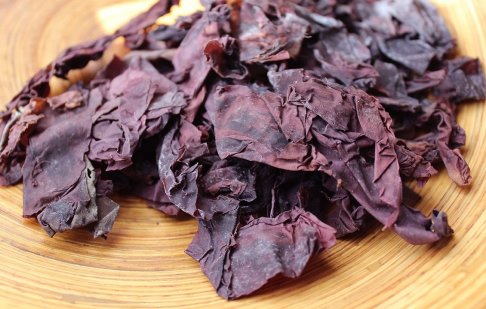
This sounds really good. It tastes just like bacon when fried and who doesn't like bacon? It could be added to many foods where bacon is normally used. It could be mixed with cabbage or made into a great vegetable wrap. Maybe it could be added to a vegetable soup or added at the last minutes to fried potatoes. Lots of possibilities for this seaweed. I can't wait to try it.
January 25th, 2017
By Carolanne Wright
Contributing writer for Wake Up World
Oregon State University has cultivated a new strain of red marine algae that has researchers — and vegans — excited. A nutritional powerhouse, the aquatic plant is packed with protein, vitamins, minerals and antioxidants — to the point where it even outshines kale.
Did I mention, it also tastes just like bacon when fried?
Not only is this discovery welcome news for the health-conscious among us, but also for those concerned about the well-being of the planet. As it turns out, seaweed — this new strain in particular — can help provide a much-needed solution to some of our most pressing environmental and food security issues facing us today.
Superhero of the Sea
Seaweed farming is the next big wave of the future — for good reason. “You’re dealing with a crop that doesn’t require fresh water, it does not require arable land,” says Charlie Yarish, a professor of ecology and evolutionary biology at the University of Connecticut. “We’re starting to see in western cultures there are some very interesting attributes of seaweed that fit our needs. One of the major problems that coastal managers have has to do with managing nutrients.”
In short, seaweed is unique in that it has the ability to take up nutrients in the water, which would otherwise harm marine ecosystems — and convert them into living tissue, a process known as bioextraction.
“If you use the right seaweeds, you can actually start extracting nutrients,” Yarish told ThinkProgress. “In areas where you have excess nutrients, that’s an opportunity. We’re doing an ecosystem service, and creating crops.”
Many times, coastal waterways are polluted with nitrogen from the run-off of agricultural fertilizers. When these waterways become oversaturated with nitrogen, phytoplankton and algal blooms develop, which deplete oxygen in the surrounding areas and creates dead zones.
“That’s just not good for the environment,” said Yarish. He adds,“Economic values decline for coastal communities and the very resource that people want to live by is starting to be degraded.”
This is where seaweed farms come in. These oceanic plants don’t just survive in problematic coastal waters, they downright thrive. And the seaweed doesn’t only mop up surplus nutrients, it also helps to curb ocean acidification due to excess carbon dioxide in the atmosphere. Seaweed is known to extract an overabundance of CO2 out of the water and use it, while at the same time lowering the water pH — creating a healthier marine ecosystem.
As it turns out, the red seaweed discovered at Oregon State University could be just the kind of hardy and adaptable plant we need to clean up our oceans, as well as assist in sustainably feeding the some nine billion people that are projected to live on the planet by 2050.
Dulse: A New Strain of Sea Vegetable with Exciting Possibilities
Dulse (Palmaria sp.) grows abundantly along both the Pacific and Atlantic coastlines. When harvested and dried, it sells for around $90 a pound. But Chris Langdon, a professor in the Department of Fisheries and Wildlife, and his colleagues at OSU Hatfield Marine Science Center, have cultivated a new strain of dulse which could forever change how we view seaweed altogether.
With the appearance of translucent red lettuce, the new strain is brimming with a range of vitamins and minerals — and packs up to 16 percent protein.
What began as research into a superfood source for commercial abalone farms, has morphed into a new “specialty crop” for humans — one that has twice the nutritional value of Kale. To date, there are no commercial operations that cultivate dulse for human consumption in the United States. Dulse currently found in health food stores is a different strain than the one created by the OSU team. It’s also harvested, not cultivated.
For years, powdered dulse has been added to smoothies, or used as flakes sprinkled over food — especially in northern Europe. But the new OSU strain is unique in that it is versatile in its fresh form. “This stuff is pretty amazing,” says Langdon. “When you fry it, which I have done, it tastes like bacon, not seaweed. And it’s a pretty strong bacon flavor.”
The strain has been developed to be farmed, which, the research team hopes, will open the door for a new industry. Already, “several Portland-area chefs are now testing dulse as a fresh product and many believe it has significant potential in both its raw form and as a food ingredient.”
New recipes and products — with dulse as the main ingredient — are also in the works through OSU’s Food Innovation Center in Portland. Needless to say, the vegan market alone is poised to be a wildly successful niche for the bacon-like seaweed.
Back at the University of Connecticut, Charlie Yarish emphasizes the extraordinary potential for the plant.
Read More


